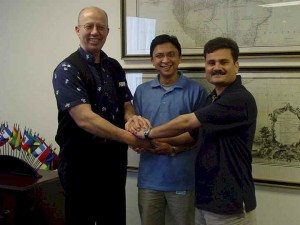WASHINGTON, D.C. —The Department of Defense (DOD) actively supports global security cooperation through its five regional security education centers, three of which are part of the National Defense University (NDU) in Washington, D.C. Fellows are invited to engage in strategic planning, knowledge-sharing and relationship-building activities. Their participation is part of the continuous efforts to support governments by providing leading-edge specialized education, as well as facilitating multilateral dialogue in defense and international security matters to enhance effective policy formulation and decision-making.

Mr. Eduardo Quiroga from Chile (left) Mr. Pratik Bickram Rana from Nepal (center) and Dr. Babar Shah from Pakistan (right) reunited this summer in Washington D.C.
Initially these multilingual and cross-cultural centers were created as an effective interaction to address the defense and security needs of each region in particular. But the imaginary lines dividing the geographic regions in the world are blurring, and issues are no longer limited to a single region. Furthermore, some countries belong to more than one region, as it is the case of Chile , which belongs to both the Western Hemisphere and also the Asia-Pacific region. This attests to the importance of these centers in serving as an interface that creates —not only regional, but also global—communities of international security cooperation based on mutual understanding and trust.
A good example of how the regional security education centers are actively supporting global security cooperation is the coincidental and somewhat historic encounter this summer in Washington , D.C. of three individuals, who in mid-2004 attended the 12 week Executive Course on defense and security studies at the Asia-Pacific Center for Security Studies (APCSS) in Hawaii . Dr. Babar Shah from Pakistan and Mr. Pratik Bickram Rana from Nepal, were attending the Executive Seminar at the Near-East South-Asia Center for Strategic Studies (NESA), when they met their former APCSS classmate, Mr. Eduardo Quiroga from Chile, who was attending the Interagency Coordination and Counterterrorism course at the Center for Hemispheric Defense Studies (CHDS), the regional security education center for the Western Hemisphere. The three former classmates were clearly excited to meet again and wasted no time in exchanging observations and updates on their respective professional projects.
When asked about the programs in which they participated, all of them agreed on their value on a professional level because of the relevant theoretical knowledge and the practical applications. Besides preparing them for assignments in defense, international security and foreign policy, Mr. Rana, who works at the Principal Secretariat of the Royal Palace in Nepal, pointed out that the APSSC program “broadened his horizon” and enabled him to learn “…different perspectives about issues affecting my country, but also about issues that affect the other 43 countries in that region and those that affect the region as a whole.”
Dr. Shah, who is an associate professor of the Area Study Center for Russia , China and Central Asia of the University of Peshawar in Pakistan , added that “…the APCSS program changed the perception we had of the concept of security. Before, we used to think only in terms of military security in the defense of our nations. Now, we are aware of security from a human perspective, as a shared responsibility among domestic law enforcement agencies, and also from a perspective of international security cooperation among nations.” Furthermore, since that course lasted three-months, it enabled them “…to really get to know each other. When I left, I felt that I had made friends that I could trust.” Dr. Shah stated that sometimes he cannot get first-hand information through media reports, and he relies on these relations “…to get first-hand information from people that I trust.”
Mr. Quiroga, a senior advisor to Chile ’s National Defense Staff, added that the value could be measured “not only in each program, but also in a cumulative sense; and not only professionally, but also in terms of personal growth”. He has embraced a life of public service, but participating in these programs enabled him to extrapolate from his personal journey as to redefine his professional role of serving his country and go beyond to include serving the global community. With this newfound purpose, Mr. Quiroga is now actively engaged in knowledge-sharing and international affairs, while participating in defense and international security activities.
When describing the differences between the programs, Mr. Quiroga also pointed how the subsequent courses at CHDS built on the excellent introduction received at APCSS by providing specialized knowledge and tools; a sentiment that was reiterated by Dr. Shah and Mr. Rana, who attended courses at NESA. Later, Dr. Shah added that “…it was really helpful to visit some government institutions because it enabled us to focus on policy formulation, decision-making processes and the government structures in the United States,” and Mr. Rana explained that these kinds of interactions could also make all of us more sensitive to our differences in culture, while enabling us to work together more amicably on a wide range of issues.
As they were catching up with their respective projects, Dr. Shah expressed how these programs enhanced his knowledge and therefore his confidence in handling defense and security matters, and Mr. Quiroga pointed out how important it was to be given the opportunity to meet with their counterparts around the world and build a network of friends who shared the same goals and interests in defense and security. All of them expressed disappointment at how quickly the three weeks in Washington , D.C. went by and wished they had more time to build and cultivate new relations. In that spirit, they suggested the development of a “cross-regional seminar” where they could return as alumni to extrapolate and share knowledge across regions. In the meantime, they made the commitment to regularly keep in touch with the shared hope that they would see each other again…soon.






Leave A Comment